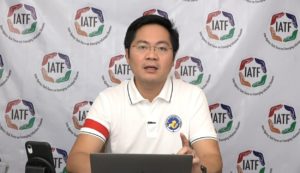
The Inter-Agency Task Force for the Management of Emerging Infectious Diseases (IATF) has approved the National Economic and Development Authority’s (NEDA) proposal to address the country’s supply chain concerns.
The state planning agency specifically proposed supply chain regulatory impact assessments and the development of a Supply Chain Analysis (SCAN) dashboard.
IATF spokesperson and Cabinet secretary Karlo Alexei Nograles, in a press briefing on April 16, said the regulatory impact assessments will be referred to the IATF—as a whole or to any of its member agencies—while the outputs of the SCAN dashboard will be referred to the National Task Force COVID-19 for its consideration.
Nograles said the two projects are in cooperation with partner agencies and select private entities.
NEDA’s Network’s Hub is setting up a transport analytics tool to address supply chain concerns and bottlenecks to the supply, distribution, and movement of essential goods and services, according to President Rodrigo Duterte’s second report dated April 6 to the Joint Congressional Oversight Committee on the Bayanihan to Heal as One Act.
The Hub includes representatives from the Philippine Chamber of Commerce and Industry, Supply Chain Management Association of the Philippines, Philippine Exporters Confederation, Export Development Council-Networking Committee on Transport and Logistics, Confederation of Truckers Association of the Philippines, Haulers and Truckers Association in the Waterfront, United Portusers Confederation, Philippine Multimodal Transport and Logistics Association, Chamber of Customs Brokers, Inc., and Container Depot Association of the Philippines. From the government side, representatives are from the Bureau of Customs, Philippine Ports Authority, Maritime Industry Authority, Anti-Red Tape Authority, Department of Transportation, Department of Agriculture, and Department of Trade and Industry.
Moreover, NEDA and the University of the Philippines Public Administration Foundation are creating a national supply chain plan for essential medical supplies, food commodities, and other critical materials during the period of State of Public Health Emergency,
The plan is to provide an end-to-end supply chain from procurement, sourcing, manufacturing, quality and food safety, to logistics and distribution to consumers. – Roumina Pablo





